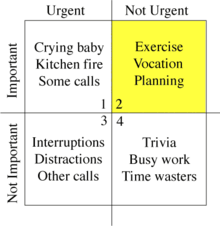Without a doubt, you’ve heard about “picking your priorities” before.
When you have lots of work to do and very little time (don’t we all?), you make a list of everything that needs to be done and pick out the most important ones.
This way, you know what to work on first. And you can leave all the rest for once those tasks are finished.
But have you tried doing the opposite?
Picking out which are the least important tasks for you can be just as important.
Say it’s the start of the new year for example. And you have made the ambitious new year’s resolution of doing some kind of physical activity every day, studying Spanish 5 hours a week and building a house.
Where do you find the time? Because let’s be honest here, there is no such thing as “free time”.
Even time spent doing nothing is spent doing nothing. So it’s not free, it’s time you use to get some rest and do nothing.
That means whatever habit, project or hobby you add to your life will “steal time” from something else. And if you don’t consciously make the decision what other activity you want to sacrifice for it, “life” will choose for you.
In the past, every time I took on a new project, it would either replace a big part of the time I spent with friends, the time I spent sleeping, or from very important work-related tasks I procrastinated on.
The problem is that if you just add something to your schedule without removing something, you can end up feeling very stressed.
Because after a while, it’s just too much to fit in (That’s what she said.)
And if you don’t choose up front, chances are that like in my case, the new activity can get in the way of some more important things without you knowing it.
This can be avoided by not only choosing your priorities deliberately, but also your posteriorities.
You figure out exactly which things in your life you find the least important. So those can be the ones to go out the window first when something new comes up.
If you watch a lot of TV or spend a lot of time mindlessly browsing the interwebs or social media, this is a no-brainer. (Pun intended ? )
Take out those things first.
But if your life is already pretty balanced and filled with exciting stuff, choosing your posteriorities can be a lot harder than you expected. Especially if we’re talking about a major project like a new business or building a home.
It can be very tempting to cut away some time from some of the things you do that seem very unproductive, like hanging with friends or relaxing. But those are actually very important things to keep you happy.
One of the easiest way to figure out your posteriorities is by using the urgent/Important matrix, a concept that is found in a lot of different books about productivity / time management, as shown below:

Where your priorities are on this Matrix are obvious. They are mostly located in the upper right corner. The stuff that’s simply “important”. Like maintaining your health, running your business, spending time with your friends.
The things in the upper left are things you generally don’t want to be dealing with, but who come even before your priorities.
When looking for your posteriorities, the best place to look is in the lower right corner. In other words, the things that are neither urgent nor important. Most of these things are useless. Like filling in irrelevant paperwork, scrolling through your Facebook news feed, etc.
But there’s also some interesting or fun stuff in that corner as well. Like clicking through page after page on Wikipedia, researching your family tree, organizing your furniture in alphabetical order or anything that is not really on your bucket list but “would still be nice to do someday”.
So when you’re making priorities out of all the cool stuff that you want to start doing this year, make sure you don’t forget to also make a list of the least important stuff. Or you might be losing more than you gain from your new year’s resolutions ?